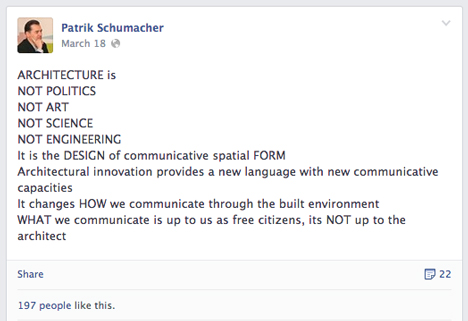
"You need to know someone is looking in order to publicly tantrum"
Opinion: Patrik Schumacher's viral-friendly outburst against political correctness in architecture this week illustrated a dark symmetry between the TED talk and the rant, says Mimi Zeiger.
This week Patrik Schumacher took to Facebook to decry the state of architecture as both a discipline and a discourse. Quickly filling his timeline, he scolded "critics and critical architects" for their agnosia, or form blindness.
"This [visual condition] is involved in the critic's inability to grasp the significance of parametricism," he wrote, aghast at the lack of appreciation of a high period of organic form derived from computational inputs. An hour later he continued his imperatives, writing "STOP political correctness in architecture. But also: STOP confusing architecture and art. Architects are in charge of the FORM of the built environment, not its content."

Although the contents of Schumacher's Facebook wall almost immediately went viral, it should go without saying that his personal comments posted on his own social media profile were not exactly new insight into the worldview of Zaha Hadid's first in command.
I caught him covering this ground at the Politics of Parametricism conference organised by CalArts' MA Aesthetics & Politics program back in November, where from the back of the auditorium he took up the mic and launched into an extended commentary (some might say mansplain) directed at panelists Laura Kurgan, Peggy Deamer, and Teddy Cruz. In her earlier talk, Deamer had critiqued the neoliberal ideology behind parametricism, and suggested that the fixation on computation "leaves behind the actual worker at almost every level: architect, fabricator, engineer, constructor."
One can only guess that this latest round of remarks from Schumacher were triggered belatedly by the tongue-lashing the firm received over the design of the Al Wakrah stadium for the FIFA World Cup 2022 in Qatar and Hadid's disavowal of architectural responsibly for migrant worker deaths. (Although Hadid's remarks were trounced for their glibness, her shrugging off of responsibility onto the Qatari government underscores the relatively tiny amount of agency the architect, even the most powerful ones, shoulders in these conditions.)
Schumacher's commentary, which continued all day, ending in a summary document and the reposting of related news items, coincided with day two of TED 2014. My Twitter feed documented the both in real time and with parallel emphasis as if they were conjoined twins. As I watched the missives go by, the paired events allowed for a reflection on the current media models filling our bandwidths: the TED Talk and the Rant. The two are uncanny in their dark symmetry. They are fuelled by access, personality, and true belief and leave little room for complexity, failure, or doubt.
TED Talks also recently faced criticism for their packaged, twenty-minute doses of future-forward cool, with a side of heartwarming humanism. ""Buildings don't just reflect our society; they shape our societies." @marchitizer #TED2014," tweeted John Cary, the quote, an aphoristic snippet of Marc Kushner's TED presentation, a spry ying to Schumacher's yang.
Architecture has always had its share of provocative statements. Walter Gropius in the Bauhaus Manifesto (1919) suggested, not unlike Kushner's optimistic TED Talk, that the built synthesis of art and architecture will "one day rise towards the heavens from the hands of a million workers as the crystalline symbol of a new and coming faith." While in 1980, Coop Himmelb(l)au took the opposite approach, concluding the practice's manifesto with the decisive phrase: "Architecture must blaze." (And, indeed, Schumacher presented his own Parametricist Manifesto in 2008.)
But the rant is something quite different from the manifesto. The rant is a privilege. Ranting is a spectator sport, which means it is predicated on the status of the ranter. You need to know someone is looking in order to publicly tantrum. To wit, when Wolf Prix needed to air a grievance regarding 2012 Venice Architecture Biennale, he issued a press release entitled "The Banal."
As perversely delectable as it is to watch star architects froth and whine as if in an episode of Real Housewives, the spectacle is just as calculated.
"There has never been a feedback loop for architecture until now, and that changes everything," read a tweet, quoting Kushner's TED Talk. A bit of a headscratcher, the decontextualised phrase makes more sense when applied to architectural discourse online.
The TED Talk and the Rant are two poles in a closed loop system. A TED talk may say all the right things and a rant may say all the wrong things, but in this digital environment, neither takes risks.
Schumacher's Facebook posts, then, despite their volubility and tenuous grasp on the rules of punctuation and capitalisation, do pose an important point, although not one he may want to claim. There is a desperate need for more architects (and critics) to argue a position and to engage in more debate, not simply preach or provoke. And, despite arguing the contrary, his comments underscore the fact that architecture is indeed political.
Mimi Zeiger is a Los Angeles-based journalist and critic. She covers art, architecture, urbanism and design for a number of publications includingThe New York Times, Domus, Dwell, and Architect, where she is a contributing editor. Zeiger is author of New Museums, Tiny Houses and Micro Green: Tiny Houses in Nature. She is currently adjunct faculty in the Media Design Practices MFA program at Art Center. Zeiger also is editor and publisher of loud paper, a zine and blog dedicated to increasing the volume of architectural discourse.